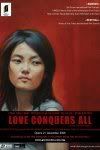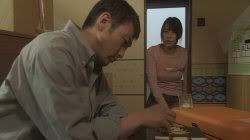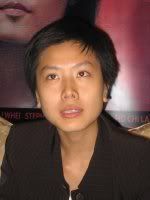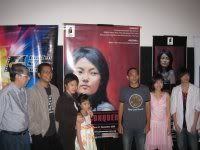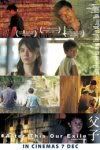CURSE OF THE GOLDEN FLOWER (drama)
Cast: Chow Yun Fat, Gong Li and Jay Chou
Director: Zhang Yimou
Time: 114 mins
Rating: * * * (out of 4)
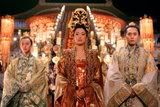
WHAT'S THE BIG DEAL? Produced at a record US$45-million budget, Zhang Zimou's “Curse Of The Golden Flower” is undeniably a cinematic spectacle with eye-boggling sets and costumes – and, of course, action sequences of 'epic proportions'. In fact, the set and costume designs are so rich and eye-catching that one may mistake the film as his 'Parade Of The Bouncing Boobs'! (We will get to that later).
WHAT'S IT ABOUT? The Golden Flower of the title refers to the Chrysanthemum – the traditional Chinese symbol of nobility. Here, it is also the personal symbol of power for a Tang Dynasty Empress (Gong Li) who has plans to use it during the annual Chong Yang celebration – the Festival of the Golden Flowers.
It is AD 928, and as the Emperor (Chow Yun Fat) marches home with his second son, Prince Jai (Jay Chou), he plans to make some changes to the succession line-up for his family. Unknown to him, his estranged Empress and two other sons, Crown Prince Wan (Liu Ye) and his youngest, Prince Yu (Qin Junjie), also have plans of their own. Prince Wan, who is having an affair with the Empress, has decided to run away with Chan (Li Man), daughter of the Imperial Doctor (Ni Dahong); the Empress, who discovers that she has been slowly poisoned, intends to use a newly-divulged secret to force the Emperor to abdicate; and the seemingly jovial Prince Yu also has something up his sleeve.
These aspirations and conspiracies, however, are supposed to be set in motion during the Chong Yang Festival but, as most palace contrivances go, you can expect a few twists in the plot. The story, loosely adapted from the 1934 play 'Thunderstorm' by the famous author Cao Yu, is about a royal family that is not just dysfunctional, but homicidal. It is no wonder that the fall of the dynasty is imminent.
HIGHLIGHTS: Released so soon after Feng Xiaogang's similarly-themed “The Banquet”, comparisons are inevitable. Both are visually stunning but movie artistry is more vibrant in “Banquet”. Zhang's spectacle lies mostly in its opulent but static sets and eye-popping costumes which sometimes threaten to distract us from the narrative. To Zhang, 'more' is definitely better and it is breath-taking to see a palace run by hundreds of nubile young servants and eunuchs; and how thousands of Imperial Guards battle each other dressed in armours of gold and blue – all among a sea of potted chrysanthemums. The most arresting sequence, however, is that of black-hooded guards dropping on ropes down to homes to do the Emperor's bidding.
LOWLIGHTS: Yes, Zhang's accent is on visuals and there is not much in the way of plot or character-development to get us involved emotionally. Chow Yun Fat is just adequate as the scheming, oppressive Emperor; Gong Li almost gets our sympathy as the victimised Empress; and Liu Ye is suitably pathetic as the helpless Crown Prince. Li Man provides more than 'eye-candy' as the buxom Chan, while Jay Chou (who sings the theme song at the end credits) seems lost most of the time and the weakest of the cast.
THE LOWDOWN: After going overboard with unbridled action and stunts in his big-budget efforts like “Hero” and “House Of Flying Daggers”, Zhang seems to be paying more attention to the narrative here. He just needs to concentrate more on getting the audience involved to reach that 'perfect balance' like that of “Raise The Red Lantern”.


